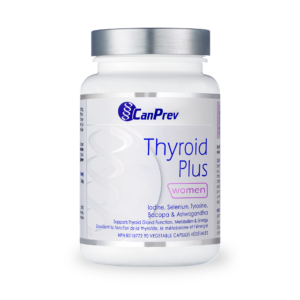Your thyroid is a small gland with a mighty role. Nestled at the base of your neck, this butterfly-shaped powerhouse supports nearly every system in your body. Despite its profound impact on overall health, thyroid imbalances often go unnoticed or are mistaken for other issues. Maybe you’ve felt unusually tired, noticed shifts in your weight, or felt your mood take unexpected dips.
Understanding how your thyroid works, recognizing signs of imbalance, and learning how to support it naturally can bring you one step closer to feeling like yourself again.
What is the thyroid?
The thyroid is a vital part of your endocrine system—a network of glands that produce and regulate hormones throughout your body. Located just below your voicebox, your thyroid produces hormones that are essential for controlling many critical functions like metabolism, energy production, and temperature regulation.
The two primary thyroid hormones are T3 (Triiodothyronine) and T4 (Thyroxine). These hormones control the speed of your body’s processes, ranging from how efficiently you burn calories to how quickly your heart beats. T4 is the inactive form, and it gets converted into the active form, T3, in various tissues throughout the body.
Your body converts T4 into T3 in different tissues, allowing T3 to regulate processes like metabolism and energy production. Without this conversion, your body wouldn’t be able to perform these key processes effectively.
When your thyroid makes either too much or too little of these important hormones, it can disrupt both your physical and emotional health. These imbalances often result in thyroid disorders like hypothyroidism and hyperthyroidism.
Hypothyroidism vs. hyperthyroidism
The thyroid’s job is to maintain balance, but when it’s underactive or overactive, it can affect many aspects of your health. Here’s how these conditions differ:
Hypothyroidism (underactive thyroid)
Hypothyroidism occurs when your thyroid doesn’t produce enough thyroid hormones. As a result, your body’s metabolism slows down, and you might experience symptoms like:
- Fatigue and persistent low energy
- Weight gain or difficulty losing weight despite diet and exercise
- Dry, flaky skin and brittle hair
- Sensitivity to cold temperatures
- Constipation
- Depression or low mood
- Brain fog and trouble concentrating
- Heavy menstrual bleeding
- Muscle aches
- Joint pain and stiffness
This condition is more common in women than men and can develop gradually, often going unnoticed for months or even years. If left unchecked, hypothyroidism can also lead to high cholesterol and heart disease.
Hyperthyroidism (overactive thyroid)
In contrast, hyperthyroidism occurs when the thyroid produces too many hormones, speeding up your metabolism. This can cause symptoms such as:
- Unexplained weight loss despite a healthy appetite
- Rapid or irregular heartbeat (palpitations)
- Excessive sweating and heat intolerance
- Nervousness, anxiety, or irritability
- Difficulty sleeping or insomnia
- Tremors (shaking hands or fingers)
If left untreated, hyperthyroidism can increase the risk of osteoporosis and heart conditions.
Women and thyroid health
When it comes to thyroid health, women are 10 times more likely than men to develop thyroid disorders. Why? It often comes down to the immune system and hormonal changes.
Women typically have more active immune systems than men, which can be both a strength and a vulnerability. While this heightened activity offers stronger protection, it also increases the risk of autoimmune conditions such as Hashimoto’s thyroiditis and Graves’ disease. These conditions result in the immune system mistakenly attacking the thyroid, either slowing it down (Hashimoto’s) or speeding it up (Graves’).
Hormonal shifts add another layer of complexity when it comes to women’s thyroid health. Pregnancy, postpartum, and perimenopause bring significant fluctuations in hormones like estrogen and progesterone, which can impact thyroid function. During pregnancy, for example, the body’s increased demand for thyroid hormones to support fetal development can sometimes reveal or worsen thyroid imbalances. Similarly, the hormonal turbulence of perimenopause can trigger or exacerbate symptoms of thyroid dysfunction.
How your thyroid affects your emotions
When your thyroid isn’t producing enough hormones (T3 and T4), it can create a ripple effect in the brain, leading to emotional challenges. These can include:
Hypothyroidism:
- Depression: Low thyroid hormones can decrease serotonin, the “feel-good” neurotransmitter in the brain, which is why depression and feelings of sadness are common.
- Irritability and emotional sensitivity: Hypothyroidism affects the body’s ability to regulate the stress hormone, cortisol. This can in turn make it harder to cope with stress, leading to irritability or a quick temper. Even small setbacks might feel overwhelming.
- Brain fog: Slowed brain activity can cause concentration issues, memory problems, and a sense of mental sluggishness. This foggy feeling can leave you feeling disconnected and down.
Hyperthyroidism:
An overactive thyroid releases too much T3 and T4, which can overstimulate various systems in your body. The excess of thyroid hormones may trigger:
- Anxiety and nervousness: With the body in overdrive, you might feel constantly anxious, jittery, or on edge. This can include heart palpitations, excessive sweating, or irritability.
- Racing thoughts: Hyperthyroidism can also cause a flood of rapid, often disorganized thoughts. This mental chaos can be exhausting, leaving you feeling overwhelmed or agitated.
- Restlessness and insomnia: The overstimulation of the nervous system can make it hard to wind down or relax, leading to trouble sleeping and increased feelings of restlessness.
Thyroid testing guide
When it comes to understanding your thyroid health, getting the right tests is key. Regular check-ups are important, especially for women over 35 as thyroid disorders become more common with age. Here’s a breakdown of the most common thyroid tests, what they measure, and how to interpret the results:
1. TSH (Thyroid Stimulating Hormone)
TSH is a hormone produced by your pituitary gland that tells your thyroid to produce T3 and T4. It’s often the first test doctors use to assess thyroid function. This is typically done via a blood test, with the recommended range for TSH being between 0.4 and 4.0 mU/L.
2. T3 and T4
To test your T3 and T4 levels, your health care practitioner will typically perform a blood test to measure the amounts of these thyroid hormones.
T3: This hormone regulates metabolism and energy production. Low T3 can indicate hypothyroidism, while high T3 levels can signal hyperthyroidism. The total T3 test measures all the T3 in your blood, including both the T3 that’s attached to proteins and the T3 that’s freely circulating. The free T3 test measures only the T3 that is freely floating in your blood.
The recommended range for total T3 is 60 to 180 nanograms per deciliter (ng/dL), or 0.9 to 2.8 nanomoles per liter (nmol/L).
The recommended range for free T3 is 130 to 450 picograms per deciliter (pg/dL), or 2.0 to 7.0 picomoles per liter (pmol/L).
T4: This hormone is produced in larger quantities, and a high or low level can also indicate thyroid dysfunction. When T4 is low, it’s often an early sign of hypothyroidism.
The recommended range is 0.8 to 1.9 nanograms per deciliter (ng/dL), or 10.3 to 24.5 picomoles per litre (pmol/L).
3. Thyroid antibodies
In cases of autoimmune thyroid disease (like Hashimoto’s thyroiditis or Graves’ disease), your body produces antibodies that attack your thyroid. Testing for thyroid antibodies (via blood sample) can help confirm the presence of autoimmune thyroid disease and determine whether Hashimoto’s thyroiditis or Graves’ disease is the cause of thyroid dysfunction.
Common thyroid antibodies include:
Anti-TPO (Thyroid Peroxidase Antibody):
High levels of this antibody may indicate Hashimoto’s thyroiditis, where the immune system attacks the thyroid, causing hypothyroidism. This antibody targets thyroid peroxidase, an enzyme in the thyroid gland that helps produce thyroid hormones (T3 and T4). When your immune system attacks this enzyme, it impairs thyroid function.
High levels of Anti-TPO are commonly found in Hashimoto’s thyroiditis, a condition where the immune system gradually destroys the thyroid. This leads to hypothyroidism, which means your thyroid is unable to produce enough hormones to regulate your metabolism, energy, and other important body functions
TRAB (TSH Receptor Antibodies):
TRAB antibodies target the TSH (Thyroid Stimulating Hormone) receptors on the thyroid. Normally, TSH stimulates the thyroid to produce thyroid hormones, but when TRAB antibodies are present, they mimic TSH and overstimulate the thyroid, causing excessive hormone production.
Elevated TRAB levels are most commonly associated with Graves’ disease, an autoimmune disorder that causes the thyroid to become overactive, resulting in hyperthyroidism.
Remember to always consult with your healthcare provider when it comes to testing, interpreting your results and deciding on your next steps.
Taking care of your thyroid naturally
With nourishing foods, calming routines, and supportive nutrients, you can help keep your thyroid healthy and balanced.
Dietary support
Nutrients like iodine, selenium, zinc and ashwagandha are essential for thyroid health. Eating a balanced diet rich in whole foods, such as nuts, seeds, seaweed and lean protein, can help provide your body with the necessary nutrients to support healthy thyroid function.
Natural supplements
CanPrev’s Thyroid Plus is formulated with essential minerals, vitamins and herbs to support an under-active or sluggish thyroid. It also supports healthy metabolism and energy production. This formula features iodine, a key component of T4 and T3, as well as selenium, a cofactor for converting T4 into the more potent T3.
Stress management
Chronic stress can raise cortisol levels, which interfere with the thyroid’s ability to convert hormones and function properly. Consider incorporating stress-reducing practices that suit your lifestyle and preferences. These can include spending time in nature, enjoying your favourite hobbies or leaning on your support systems.
Exercise
Exercise helps support thyroid health by reducing stress and balancing cortisol levels. Regular physical activity also boosts circulation, promotes healthy metabolism and encourages better nutrient delivery to the thyroid. If you have swelling in your ankles and feet, low impact exercises like swimming, water aerobics and pilates can help to ease the pressure on your joints. Strength training exercises using resistance bands or free weights can also help improve and maintain muscle mass and strength.
Sleep
Sleep is crucial for thyroid health because it allows your body to restore and regulate hormone production, including thyroid hormones. A good night’s rest also helps regulate stress hormones, which can support healthy thyroid function and prevent imbalances. Consider creating a relaxing routine to help ease into bedtime. These can include a nightly cup of non-caffeinated herbal tea, dimming the bedroom lights or reducing screen time before bed. Be sure to aim for 7-9 hours of quality sleep each night.
Your thyroid plays a vital role in how you feel each day. By understanding how it functions is a step toward reclaiming your energy and balance. Take the time to listen to your body and seek the support you need—whether it’s through testing, lifestyle changes, or natural supplements.


